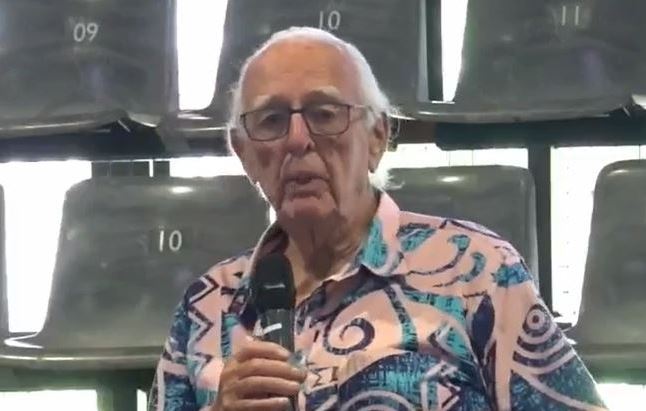Growers and farmers sow collective seeds in bid for better harvest
Tuesday 13 December 2022 | Written by Al Williams | Published in Environment, Local, National

John Tierney speaking at the Kai Natura Taokotai meeting yesterday. 22121214
A Cook Islands co-operative of farmers and growers are moving forward in marketing and branding their unique products here and around the world.
Members of Kai Natura Taokotai (KNT) gathered at the National Auditorium on Monday where a number of guest speakers from here and abroad outlined the purpose, actions and solutions for a primary economy hammered by the likes of Covid-19 in recent years.
The group is seeking access to a wider range of markets and have their eyes on a range of solutions including the establishment of a more than $1 million secure heat treatment plant, a set of New Zealand biosecurity standards certified by the NZ Ministries and managed by the Cook Islands Agriculture Ministry, and a short list of certified crops for export to NZ.
Outlined in Monday’s meeting, the next step is for farmers and Government to agree on industry diversification, biosecurity measures, quarantine standards, pack house assets and heat treatment measures. That would evolve to become Cook Islands food brands through a marketing strategy.
Group technical adviser James Burns said there is now an opportunity to kick off primary industries again.
He said primary industries were the backbone of the economy prior to the 1970s, and the advent of tourism.
“Right now is the time to revive the primary sector, there is a co-operative working together to establish partnerships, and liaising with the Minister of Agriculture to ensure there is support.”
One of the speakers, MG Marketing import manager Humphrey Lawrence, speaking from New Zealand, said he was happy to work with the co-operative in developing heat treatment facilities for mangoes and pawpaw.
Farmer yields, crop profiles, rural and arable land measurements, plus a framework based on data are also proposed with a timeframe in the second quarter of 2023.
Through an interactive big screen launch, the group illustrated preliminary feasibility studies for crops, and discussed the benefits of co-operatives.
The group outlined its objectives with greater leverage through agreement and unity, common standards, greater strength in lobbying and raising the status of farming, better farm prices and better welfare.
A survey was given to attendees asking for farmer details, areas under cultivation, locations, soil types, farm resources and farmer support.














































